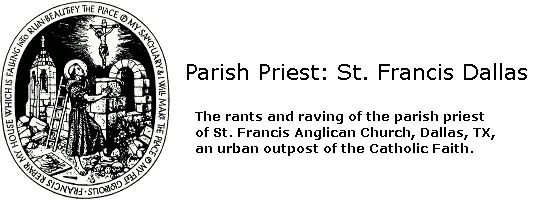A woman named Martha received him into her house.
It
is curious that we so rarely find Jesus in a domestic setting. “Foxes have holes, and
birds of the air have nests; but the Son of man has nowhere to lay his head.” Jesus is born not in a home, but in a makeshift stable, presented publicly
in temple and finally lost and found in the streets of the big city, where he will
spend most of his time. “And he went down with
them and came to Nazareth, and was obedient to them.” After that, the screen
goes blank until his baptism. From that point
on it is not the cozy old home place but the road to Jerusalem, to the fickle
crowds, to the Garden of Gethsemane, where he sweats blood and wrestles with
his agony, and finally to the Cross, the nails and death.
The story in the Gospel this Sunday is the great
exception to the rule: a bit of joy in the approaching darkness: the
little house in Bethany, filled with pot and pans, water on the boil, chores,
obligations, love and the company of two women.
One is always busy, ruling over things, always behind
schedule, and concerned that everything will come out right. At the same time she contributes a note of verisimilitude:
the tension, the stress, the impatience, the anger, which is also inevitably a part
of family and home: "Lord, do you not care that my sister has left me to
serve alone? Tell her then to help me."
The other sits at the feet of Jesus and listens like a precocious child who cannot lose the opportunity to hear
from a guest, attentive the way only a child can be at story-time.
This passage has often been interpreted as an
allegory of the contemplative and active lives and of the superiority of the
contemplative over the active: “one thing is needful. Mary has chosen the good
portion, which shall not be taken away from her."
But St. Augustine’s take on this episode is a different.
He points out that we are not to read it
as a criticism of Martha’s service. If we took it in this sense, "then people
ought to stop ministering to the needy; they ought to choose "the better
part," which will not be taken from them; they ought to devote themselves
to the Word, to be eager for the pleasant teaching; occupy themselves with the
knowledge that saves; not care whether there is a stranger in town or whether
someone needs bread or clothing, someone needs to be visited, or to be bought
back or to be buried.
Well, then, what is the meaning of Jesus
concluding remark? Augustine thought that the clue lay in the observation that
Mary’s "better part" would not be taken away from her, that is, her
part was better precisely because it would never be taken away. The two women
stand for two lives, the life of this age and the life of the age to come. This
life is full of troubles and difficulties, fears and temptations, and to meet
them Martha gets to work. But in the next life there will be no need of Martha’s
efforts because there will be no hunger
or thirst or nakedness or illness. But Mary’s activity of listening to the Word of Truth himself will continue in the next life, when instead of the
crumbs that she and we can gather now we and she will be feasting at the full
table of the Lord. "We now are where Martha was; we hope for what Mary was.
Two centuries later St. Gregory the Great said
that the two lives were united in Christ who worked miracles in the city and
also spent nights in prayer on the mountain. He thus provided an example,
teaching us not, out of love of contemplation, to neglect the care of our
neighbors, nor again so to engage in care of our neighbors that we abandon
contemplative pursuits; but to keep the two together in our minds so that the
love of our neighbor does not interfere with the love of God and the love of
God, transcendent as it is, does not cast out the love of our neighbors.
To be sure Mary chose the better part at Christ’s
feet because our listening to the Word will never be over and done with. But
Martha the busy one, the one with whom likely most of us sympathize, was not so
different from her sister. She came in and out, keeping the kitchen door open,
and with her hands down in the flour, listened with one ear and loved.
A woman named Martha received him into her house.


No comments:
Post a Comment